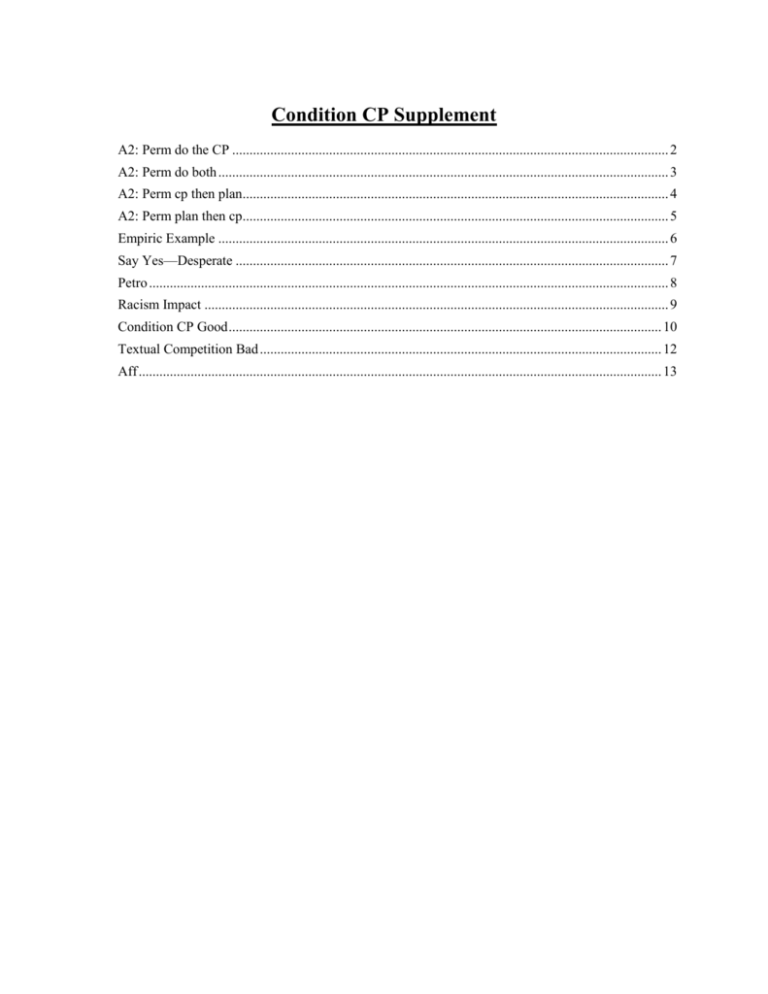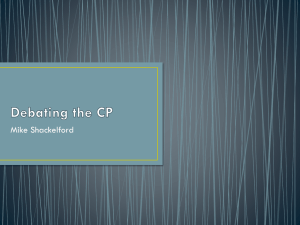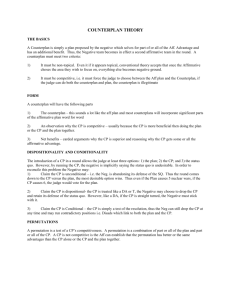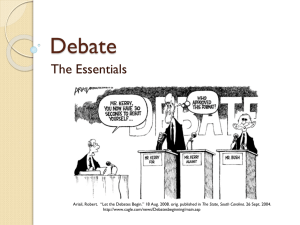Condition Counterplan Blocks – Kansas 2012
advertisement

Condition CP Supplement A2: Perm do the CP .............................................................................................................................. 2 A2: Perm do both .................................................................................................................................. 3 A2: Perm cp then plan........................................................................................................................... 4 A2: Perm plan then cp........................................................................................................................... 5 Empiric Example .................................................................................................................................. 6 Say Yes—Desperate ............................................................................................................................. 7 Petro ...................................................................................................................................................... 8 Racism Impact ...................................................................................................................................... 9 Condition CP Good ............................................................................................................................. 10 Textual Competition Bad .................................................................................................................... 12 Aff ....................................................................................................................................................... 13 A2: Perm do the CP The counterplan is severance: a) Resolved means to make a firm decision AHD 6 (American Heritage Dictionary, http://dictionary.reference.com/browse/resolved) Resolve TRANSITIVE VERB:1. To To decide or express by formal vote. make a firm decision about. 2. To cause (a person) to reach a decision. See synonyms at decide. 3. b) “Should” is mandatory and immediate Summers 94 (Justice – Oklahoma Supreme Court, “Kelsey v. Dollarsaver Food Warehouse of Durant”, 1994 OK 123, 11-8, http://www.oscn.net/applications/oscn/DeliverDocument.asp?CiteID=20287#marker3fn13) ¶4 The legal question to be resolved by the court is whether the word "should"13 in the May 18 order connotes futurity or may be deemed a ruling in praesenti.14 The answer to this query is not to be divined from rules of grammar;15 it must be governed by the age-old practice culture of legal professionals and its immemorial language usage. To determine if the omission (from the critical May 18 entry) of the turgid phrase, "and the same hereby is", (1) makes it an in futuro ruling - i.e., an expression of what the judge will or would do at a later stage - or (2) constitutes an in in praesenti resolution of a disputed law issue, the trial judge's intent must be garnered from the four corners of the entire record.16 [CONTINUES – TO FOOTNOTE] 13 "Should" not only is used as a "present indicative" synonymous with ought but also is the past tense of "shall" with various shades of meaning not always easy to analyze. See 57 C.J. Shall § 9, Judgments § 121 (1932). O. JESPERSEN, GROWTH AND STRUCTURE OF THE ENGLISH LANGUAGE (1984); St. Louis & S.F.R. Co. v. Brown, 45 Okl. 143, 144 P. 1075, 1080-81 (1914). For a more detailed explanation, see the Partridge quotation infra note 15. Certain contexts mandate a construction of the term "should" as more than merely indicating preference or desirability. Brown, supra at 108081 (jury instructions stating that jurors "should" reduce the amount of damages in proportion to the amount of contributory negligence of the plaintiff was held to imply an obligation and to be more than advisory); Carrigan v. California Horse Racing Board, 60 Wash. App. 79, 802 P.2d 813 (1990) (one of the Rules of Appellate Procedure requiring that a party "should devote a section of the brief to the request for the fee or expenses" was interpreted to mean that a party is under an obligation to include the requested segment); State v. Rack, 318 S.W.2d 211, 215 (Mo. 1958) ("should" would mean the same as "shall" or "must" when used in an instruction to the jury which tells the triers they "should disregard false testimony"). 14 In praesenti means literally "at the present time." BLACK'S LAW DICTIONARY 792 (6th Ed. 1990). In legal parlance the phrase denotes that which in law is presently or immediately effective, as opposed to something that will or would become effective in the future [in futurol]. See Van Wyck v. Knevals, 106 U.S. 360, 365, 1 S.Ct. 336, 337, 27 L.Ed. 201 (1882). Voter because it destroys stable neg ground A2: Perm do both Promising genuine condition but doing the plan regardless is intentional deception, which is immoral and should be rejected. Mark C. Murphy, 1996 [41 Am. J. Juris. 81] Bok's remarks capture the insight that what disturbs people about lying is not fundamentally that lies are contrary to the good of knowledge, though lies certainly are contrary to that good. What is most troubling about being lied to is that lies infect the decisionmaking process, undermining the good of practical reasonableness. Thus, the account of the moral absolute against lying defended here does justice to what bothers reflective people about being the victim of lies. 39 I have argued that although Finnis is right to think that the lie is an act directed against the intrinsic good of knowledge, the wrongfulness of lying is most adequately explained by reference to the good of practical reasonableness. Lying is absolutely morally forbidden, in last analysis, because refraining from lying is necessary to show adequate respect for the status of other agents as practical reasoners. On this matter, at the very least, natural law theory should affirm its agreement with Kant. 40 It’s intrinsic because neither the plan nor the counterplan use non-binding conditions. Reject it because intrinsic perms can co-opt our offense by adding planks to the plan and make plan texts unstable. No solvency—states will only agree to comply if they perceive that they will get something in return. A2: Perm cp then plan It’s severance—they delay plan action which severs the immediacy of the word should Summers 94 (Justice – Oklahoma Supreme Court, “Kelsey v. Dollarsaver Food Warehouse of Durant”, 1994 OK 123, 11-8, http://www.oscn.net/applications/oscn/DeliverDocument.asp?CiteID=20287#marker3fn13) ¶4 The legal question to be resolved by the court is whether the word "should"13 in the May 18 order connotes futurity or may be deemed a ruling in praesenti.14 The answer to this query is not to be divined from rules of grammar;15 it must be governed by the age-old practice culture of legal professionals and its immemorial language usage. To determine if the omission (from the critical May 18 entry) of the turgid phrase, "and the same hereby is", (1) makes it an in futuro ruling - i.e., an expression of what the judge will or would do at a later stage - or (2) constitutes an in in praesenti resolution of a disputed law issue, the trial judge's intent must be garnered from the four corners of the entire record.16 [CONTINUES – TO FOOTNOTE] 13 "Should" not only is used as a "present indicative" synonymous with ought but also is the past tense of "shall" with various shades of meaning not always easy to analyze. See 57 C.J. Shall § 9, Judgments § 121 (1932). O. JESPERSEN, GROWTH AND STRUCTURE OF THE ENGLISH LANGUAGE (1984); St. Louis & S.F.R. Co. v. Brown, 45 Okl. 143, 144 P. 1075, 1080-81 (1914). For a more detailed explanation, see the Partridge quotation infra note 15. Certain contexts mandate a construction of the term "should" as more than merely indicating preference or desirability. Brown, supra at 108081 (jury instructions stating that jurors "should" reduce the amount of damages in proportion to the amount of contributory negligence of the plaintiff was held to imply an obligation and to be more than advisory); Carrigan v. California Horse Racing Board, 60 Wash. App. 79, 802 P.2d 813 (1990) (one of the Rules of Appellate Procedure requiring that a party "should devote a section of the brief to the request for the fee or expenses" was interpreted to mean that a party is under an obligation to include the requested segment); State v. Rack, 318 S.W.2d 211, 215 (Mo. 1958) ("should" would mean the same as "shall" or "must" when used in an instruction to the jury which tells the triers they "should disregard false testimony"). 14 In praesenti means literally "at the present time." BLACK'S LAW DICTIONARY 792 phrase denotes that which in law is presently or immediately effective, as opposed to something that will or would become effective in the future [in futurol]. See Van Wyck v. Knevals, 106 U.S. 360, 365, 1 S.Ct. (6th Ed. 1990). In legal parlance the 336, 337, 27 L.Ed. 201 (1882). The Lie will get out- turns solvency Thompson 08, Michael, staff writer for Associated Content, 11-5-. [Associated Content, The Obama Administation’s First Leak, http://www.associatedcontent.com/article/1182373/rahm_emanuel_the_obama_administrations_pg2_pg2. html?cat=9] So how does candidate Obama's camp spring virtually no leaks during a 20-month campaign, but then unleash a gusher of a leak within hours of his acceptance speech? Does this portend to more things to come? Past presidents such as Clinton and Ronald Reagan went so far as to limit participation in their most crucial White House discussions, so distressed were they by endless leaks to the press. Biden infamously has said that a hostile foreign power likely will test Obama within six months. It seems that on the domestic front, Barack Obama already is being tested by leaks within 24 hours. A2: Perm plan then cp It’s intrinsic. It adds time to the counterplan which is not a part of the counterplan text. Voter because it justifies the aff taking any action to solve our disads and k’s. Doesn’t solve—no reason that the states would comply if they are already getting funding. Empiric Example The US can condition state funding—empirics prove Port 12 Rob Port, SayAnythingBlog.com, “Democrats Propose Legislation Withholding Federal Funds From States With “Stand Your Ground” Laws”, May 8, 2012, http://sayanythingblog.com/entry/democratspropose-legislation-withholding-federal-funds-from-states-with-stand-your-ground-laws/ Democrats blame the Trayvon Martin shooting in Florida on that state’s so-called “stand your ground” self defense policy, and have all but indicted the American Legislative Exchange Council alongside George Zimmerman as coconspirators for advocating for the policy in dozens of states around the country. There is some question about whether or not the “stand your ground” policy is even applicable in the Martin/Zimmerman case. According to Zimmerman, he was on his back and being attacked when he shot Martin. If that’s true, then he couldn’t have retreated, which means that laws applying to the duty to retreat wouldn’t apply. But no matter. Democrats want to cut off federal funding for states with “stand your ground” policies and have proposed legislation in the House to do it. House Democrats said Tuesday they will offer an amendment to push to overturn stand-your-ground self-defense laws in states like Florida. The amendment, which would withhold some grants from states that have such laws, will come as part of the House’s debate on the Commerce Department spending bill. “‘Shoot-first’ laws have already cost too many lives. In Florida alone, deaths due to self-defense have tripled since the law was enacted. Federal money shouldn’t be spent supporting states with laws that endanger their own people,” said Reps. Raul Grijalva of Arizona and Keith Ellison of Minnesota, the two Democrats who are offering the legislation. “This is no different than withholding transportation funds from states that don’t enforce seat-belt laws.” The Democrats are right in that the federal government has certainly used federal funding to undermine state sovereignty in the past. That being said, if this were to be successful, it could open a new front in the gun control laws. American attitudes about guns have changed over the last few decades, with citizens become more approving of individual gun ownership. The Supreme Court, too, has finally upheld the individual right to gun ownership, but states are extremely vulnerable when it comes to federal funding. The federal government could lure states into more restrictive self-defense and gun policy by manipulating federal funding. Which is yet another argument for smaller federal government. The more dependent the states are on the federal government, the less power the state’s have to govern locally. Say Yes—Desperate States say yes—desperate for funding Christman and Riordan, 11 (Anastasia, Senior Policy analyst at the National Employment Law Project, and Christine, Policy Analyst at the National Employment Law Project, “State Infrastructure Banks: Old Idea Yields New Opportunities for Job Creation”, National Employment Law Project, Briefing Paper, December, http://www.nelp.org/page//Job_Creation/State_Infrastructure_Banks.pdf?nocdn=1) Getting stalled-out in D.C. doesn’t mean advocates for better financing for infrastructure have to sit on their hands. Indeed , in state houses across the country, lawmakers are having robust debates about infrastructure projects, and several cities have taken bold moves to identify innovative infrastructure funding mechanisms. 3 The fact is that infrastructure is a profoundly local issue and is a key determinant of a community’s standard of living. 4 As former Pennsylvania Governor Ed Rendell noted in a U.S. Congressional hearing on infrastructure, “Visible or not, properly functioning infrastructure provides us with the reliability and predictability that we as Americans have come to expect from modern daily life.” 5 Everyday Americans feel the effects of deteriorating physical assets close to home in the form of traffic delays, unsafe drinking water, inadequate public transportation and unpredictable electrical power. Local lawmakers recognize this: in a 2011 survey, more than three-quarters of U.S. mayors identified the need to prioritize maintenance of current roads and streets over building new highways, and almost half indicated a need to grow public transit capacity. 6 State and local governments and their constituents already carry much of the burden of funding these critical resources. Nationally, “transportation” is typically the third-largest state expenditure after “education” and “public welfare.” 7 Since the Cold War era, local governments have invested more than $1.25 trillion in water and sewer investments. 8 As the National Conference of State Legislatures has pointed out, “Local governments—including counties, townships and municipalities—provide approximately 30 percent of total surface transportation funding and own 77 percent of the nation’s roadway miles.” 9 Yet, federal funding streams through the National Surface Transportation Act or the Federal Highway Trust Fund send money to the states without requirements to consider the infrastructure needs of cities and metropolitan areas. As a 2008 policy brief from the National Conference of Mayors noted, “[O]f the more than $42 billion annually flowing to states for surface transportation investment, only six percent of available funds are directed to decision-makers in the nation’s metropolitan areas.” 10 Unfortunately, traditional sources of state funding aren’t doing the job. Through 2010, nineteen U.S. states cut transportation funding, 11 and in 2011 another six states followed suit. 12 To truly address the infrastructure shortcomings that affect our communities most acutely, we need state-level solutions that include input from local lawmakers and local constituents. Petro Moral side constraint Petro ‘74 Petro, Wake Forest Professor in Toledo Law Review, 1974 (Sylvester, Spring, page 480) However, one may still insist, echoing Ernest Hemingway - "I believe in only one thing: liberty." And it is always well to bear in mind David Hume's observation: "It is seldom that liberty of any kind is lost all at once." Thus, it is unacceptable to say that the invasion of one aspect of freedom is of no import because there have been invasions of so many other aspects. That road leads to chaos, tyranny, despotism, and the end of all human aspiration. Ask Solzhenitsyn. Ask Milovan Dijas. In sum, if one believed in freedom as a supreme value and the proper ordering principle for any society aiming to maximize spiritual and material welfare, then every invasion of freedom must be emphatically identified and resisted with undying spirit. Racism Impact Racism/Whitesupremacy is the cause of major forms of violence and world domination. This means their impacts are inevitable. White supremacy at root of war and eco-crisis Wise, noted antiracist activist and former policy debater, in 2006 (Tim, over 15 book publications, 400+ radio/TV appearances, in the line where you tell people who I am, that I was a twelve-time qualifier for TOCs in high school, on one of the top ten high school teams in the nation from 1985-1986, and ultimately quit debate because of its abstract way of looking at real world issues, immediately after reaching the CEDA finals at the University of Alabama in 1988."Paleness as Pathology: The Future of Racism & Antiracism in America," LIP Magazine, Summer 06) "It is the American form of white supremacy, still, as with its predecessor rooted in the dichotomization of peoples into good/bad, responsible/irresponsible, which leads a nation such as the U.S. to believe itself entitled to the resources of the earth, be they oil reserves beneath the sands of Iraq, or coal deposits in a West Virginia mountainside. That entitlement mentality precedes the drive for profit, and helps to place it in its proper context. That same mentality then contributes to the world's ecological predicament, including global climate change, soil and wetland erosion, polluted drinking water and air, and the related health effects of all these." Condition CP Good 1. Condition CPs are key to education: a. Condition CPs uniquely check the desirability of the process by which the plan is passed. b. condition forces them to defend the immediate enactment of the plan, which is key to core neg generics, allowing them to sever immediacy destroys politix, trade-off, and other main DA’s. 2. Literature checks abuse: a. There isn’t net benefit or condition literature on every actor, which sets a key limit on who can be consulted. b. We have specific literature saying that we should condition state action on the plan, which proves it’s predictable. 3. Condition increases education—you learn more about interactive political systems and relations between actors 4. Probabilistic solvency increases aff ground – the counterplan guarantees a delay and potential non-adoption. All they have to do is win one argument and the entire CP goes away. 5. Conditions Counterplans are key to fairness a. They maintain negative flexibility by hedging against unpredictable 2ac addons b. They’re key to beat small affirmatives that don’t link to anything 6. Net benefits check abuse: a. The aff always has the option of straight turning the NB and not even dealing with the solvency of the CP. Proves we don’t link to any of their “steals aff” offense b. The research burden is inevitable- reading the counterplan as a disad still would’ve forced the research burden without gaining the additional topic based education based on actor interaction 7. Best policy option—the search for perfection promotes real world education by comparing congressional options. 8. Don’t vote on potential for abuse. It’s like voting on arguments they didn’t make, in round abuse is the only objective standard. 9. Their interpretation is arbitrary: a. It’s the same as rejecting all politics disads because there’s too much stuff on the docket or they’re too complex. Don’t punish us because we’re strategic. Textual Competition Bad Evaluating whether two policies can practically co-exist is best: The Counterplan still competes textually because the plan text uses words like will or should that imply unconditional and guaranteed enforcement. 1. Counterplan Ground—textual competition destroys our ability to counterplan in uniqueness by making “ban the plan” non-competitive, which is critical to ground. The aff can always rearrange words or letter to make all counterplans not competitive. 2. Hurts Education and Clash—debating about various interpretations of texts better simulates critical thought and allows more clash because you can read disads and turns off of the effects of the policy instead of only evaluating the words in a vacuum. 3. Its bad for the Aff too—it allows counterplans to exclude a word from the plan or replace acronyms or hyphens and win on dumb net benefits like E-prime and Marcouse. Aff Clean Water Act Fails – Nothing Has changed In American Waters Ashley Lutz, 7/2 [6/2/12, Ashley Lutz is a writer for Business Insider's main page. Ashley previously worked as a reporter at Bloomberg News, covering retail. Born and raised in the Midwest, Ashley got a degree in journalism from Ohio University. “40 Years After the Clean Water Act, America’s water is as Dirty As Ever”, http://www.businessinsider.com/the-clean-water-act-pollution-2012-7 ] The Clean Water Act was passed in 1972 and was supposed to keep pollution out of America's lakes through EPA monitoring. But 40 years later, nothing has changed, according to a study by V. Kerry Smith and Carlos Valcarcel Wolloh at Arizona State University. According to the study: With data from the U.S. Geological Survey’s National Water Information System (NWIS) we find average water quality in U.S. lakes is at about the same level in 2011 as it was in 1975 with over eighty percent of the lakes in the NWIS database consistent with fishable conditions based on measures of the levels of dissolved oxygen present in them. Thus, for freshwater lakes one could conclude nothing has changed. The ineffectiveness calls into question why the federal government has spent billions of dollars enforcing the Clean Water Act with the EPA. Alt Causes – Sewage Treatment Plants Dump Toxic Waste into Waters Daily Laura Orlando, 8 [6/4/08, Laura Orlando is the Executive Director of the Resource Institute for Low Entropy Systems (RILES). She is an adjunct professor at the Boston University School of Public Health and the Associate Director of the university's Center for Ecological Public Health. A graduate of the University of Michigan and Harvard University, she is the author of numerous publications, including co-editor of "The Sludge Report," a special issue of New Solutions: A Journal of Environmental and Occupational Health Policy, Volume 12, Number 4, 2002. “Wastewater Treatment Plants: Pollution Factories”, http://www.riles.org/musings.htm ] It is no surprise that coastal wastewater treatment plants are discharging thousands of pounds of toxic waste into day (Pollution outflows to Sound routinely allowed, Seattle P-I, June 3, 2008, Robert McClure). What is surprising is that "improved treatment" is considered the solution. Effluents from sewage treatment plants, regardless of the level of treatment and disinfection, cause pollution that is harmful to life. Treatment plants are designed specifically to reduce conventional pollutants (suspended solids, oxygen-demanding substances, pH, oil and grease, and fecal coliform bacteria.) from wastewater, but not to remove metals and organic chemicals. They do not and cannot address the tens of thousands of chemicals entering the plant each day, not to mention those that are created in the treatment process (NDMA, nonylphenols, and so on). More than 2,200 wastewater treatment plants (WWTPs) are located in coastal counties and they discharge about one-third of the nation's municipal effluent. The plants also produce millions of tons of sewage sludge, a toxic byproduct of Puget Sound each wastewater treatment. A particularly problematic family of chemicals coming out the outfall pipe are called endocrine disrupting compounds, which include estrogen from birth control pills and hormone replacements. Exposure has been associated with a range of reproductive impacts, particularly in fish. One result is intersex fish - male fish with female egg cells in their testes. These transgender fish have been documented in wild fish populations downstream from wastewater treatment plants - and at their ocean outfall pipes -- across the U.S. and Europe. The Counterplan Does not solve the Root Cause of the Stand Your Ground Problems – Race Nunn, 3/21 [3/21/12, Kenneth Nunn is a professor at the University of Florida Levin College of Law, and is a member of the Florida Innocence Commission. “Racism is the problem here”, http://www.nytimes.com/roomfordebate/2012/03/21/do-stand-your-ground-laws-encouragevigilantes/racism-is-the-problem-not-the-stand-your-ground-laws?pagewanted=print?pagewanted=print ] Stand Your Ground does not permit the use of deadly force against an initial aggressor unless “the person reasonably believes that he or she is in imminent danger of death or great bodily harm and that he or she has exhausted every reasonable means to escape such danger.” Ordinarily, one would expect that a reasonable force requirement would provide ample protection against idiosyncratic or morally suspect behavior. But this is not the case when victims happen to be black. As several legal scholars have pointed out, the connection between reasonableness and race is problematic. African-Americans, black males in particular, have been constructed in popular culture as violence-prone and dangerous. Decisions regarding the reasonableness of self-defense claims should be made in court. Sociologists tell us this attitude toward black males is widely shared, sometimes unconsciously, as the Harvard implicit racism test discloses. In the minds of Americans who hold these views, fear of black males, and consequently the use of deadly force against them, is “reasonable.” A jury is particularly likely to credit a defendant’s fear of blacks when the determination of reasonableness is made not in an objective manner but from the position of someone in the defendant’s situation. Indeed, Bernhard Goetz’s acquittal of charges for the shooting of four black men in the New York subway in 1984, and the acquittal in 2008 of the police officers involved in the Sean Bell shooting, were due in no small part to their lawyers’ “fear of the black man” manipulations. Simply eliminating Stand Your Ground would not get rid of racially disparate applications of the reasonableness test. It would not prevent young men like Trayvon Martin from getting killed and their killers getting off scot-free. Self-defense claims should be limited to cases in which they are objectively reasonable, not when they are reasonable to someone in the defendant’s shoes. Additionally, decisions regarding the reasonableness of self-defense claims should be made in court. Many Stand Your Ground statutes grant killers who claim self-defense immunity from prosecution, so they cannot be arrested if the police view their assertions of self defense to be reasonable. This is wrong. The reasonableness of a killer’s actions ought to be decided in open court by juries made up of ordinary people, and not determined prior to trial in the secrecy of the police station. Stand Your Ground statutes may be problematic for a number of reasons. But if we really want to save lives and prevent future miscarriages of justice, we will have to confront the reality of race. Stand Your Ground Laws Good – Only problem is Racist Application David Codrea, 4/13 [4/13/12, Gun Rights Examiner, “'Stand your ground’ laws must be applied equally for all”, http://www.examiner.com/article/stand-your-ground-laws-must-be-applied-equally-for-all ] “John McNeil killed a white man who assaulted him on his property. But, unlike George Zimmerman, he's serving life,” Salon.com reported on Wednesday. “Not too far from Sanford, Fla., a black man named John McNeil is serving a life sentence for shooting Brian Epp, a white man who trespassed and attacked him at his home in Georgia, another stand your ground state,” we’re told. There’s a problem with that assessment. Journalist Radley Balko reminds us Georgia had not yet passed its “no duty to retreat” law, so it would not have come into play. Still, morally, are we dealing with the same circumstances and different outcomes? We don’t know. All we’ve heard about George Zimmerman has come from the mainstream media, and Gun Rights Examiner readers know firsthand how off the mark “Authorized Journalists” can be. And there are some other differences noted when this column first reported on the McNeil case back in 2010: Still, is it possible McNeil was railroaded? Is there other mitigating evidence to prove it was a “good” shoot? If their roles had been reversed, would Epp now be behind bars? Without evidence beyond what is before us, anything we could offer would be mere opinion. If the evidence warrants, Mr. McNeil deserves to have it all heard, and if it bears out his claim of self-defense, he deserves to be freed. But just as this column asked if Trayvon Martin may have had a “stand your ground” defense had he prevailed, the answer is not to eliminate such laws—it is to apply them equally, and with justice for all.






